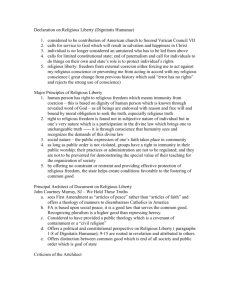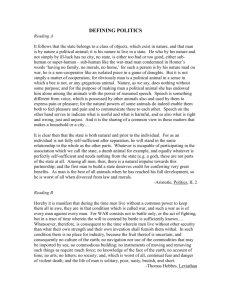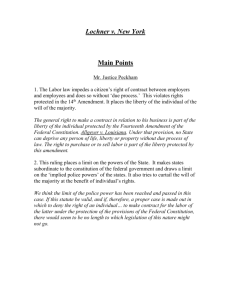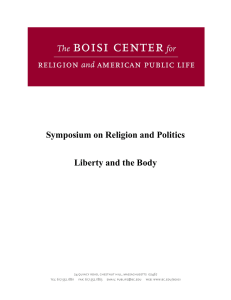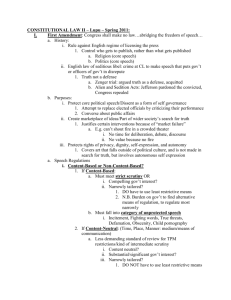Class Outline
advertisement
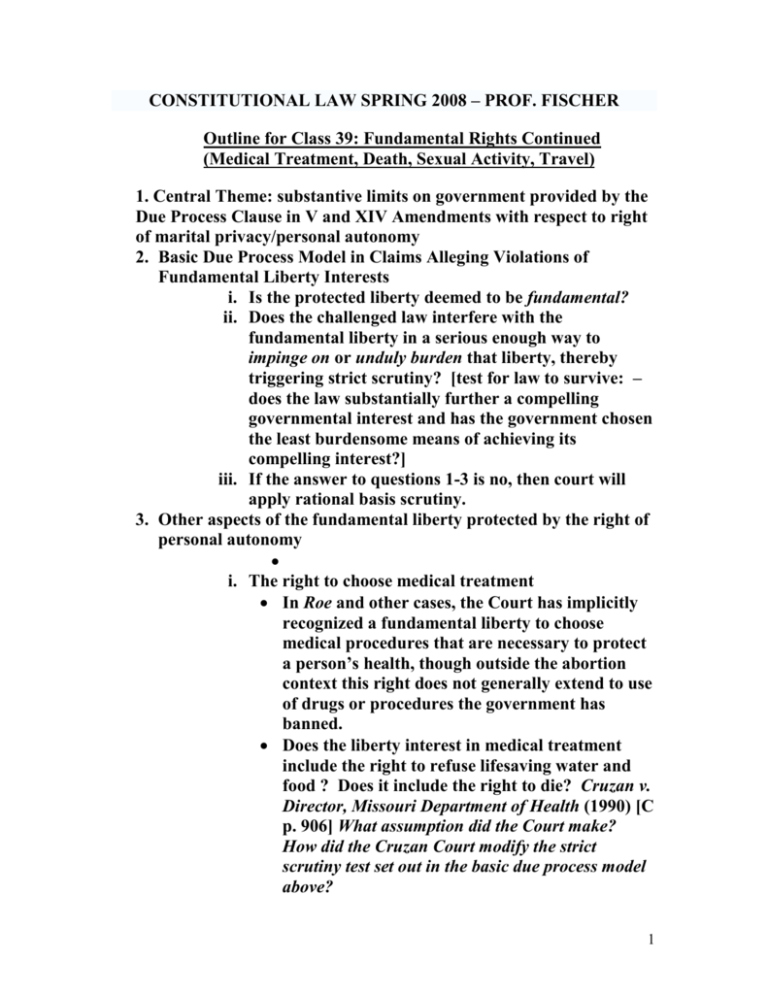
CONSTITUTIONAL LAW SPRING 2008 – PROF. FISCHER Outline for Class 39: Fundamental Rights Continued (Medical Treatment, Death, Sexual Activity, Travel) 1. Central Theme: substantive limits on government provided by the Due Process Clause in V and XIV Amendments with respect to right of marital privacy/personal autonomy 2. Basic Due Process Model in Claims Alleging Violations of Fundamental Liberty Interests i. Is the protected liberty deemed to be fundamental? ii. Does the challenged law interfere with the fundamental liberty in a serious enough way to impinge on or unduly burden that liberty, thereby triggering strict scrutiny? [test for law to survive: – does the law substantially further a compelling governmental interest and has the government chosen the least burdensome means of achieving its compelling interest?] iii. If the answer to questions 1-3 is no, then court will apply rational basis scrutiny. 3. Other aspects of the fundamental liberty protected by the right of personal autonomy i. The right to choose medical treatment In Roe and other cases, the Court has implicitly recognized a fundamental liberty to choose medical procedures that are necessary to protect a person’s health, though outside the abortion context this right does not generally extend to use of drugs or procedures the government has banned. Does the liberty interest in medical treatment include the right to refuse lifesaving water and food ? Does it include the right to die? Cruzan v. Director, Missouri Department of Health (1990) [C p. 906] What assumption did the Court make? How did the Cruzan Court modify the strict scrutiny test set out in the basic due process model above? 1 Is there a constitutional right to physician assisted suicide? See Washington v. Glucksberg (1997) [C p. 913] and Vacco v. Quill (1997) [C p. 918] Oregon has legislated to permit physician assisted suicide (Death with Dignity Act of 2003). In Gonzalez v. Oregon 546 U.S. 243 (2006), the Court held that the Attorney General did not have constitutional authority under the federal Controlled Substances Act to overrule state law concerning the appropriate use of regulated medicines. 6-3 decisions. Scalia, Thomas, and Roberts dissented. Note case did not directly consider whether there is a fundamental liberty interest to assisted suicide. ii. The right of consenting adults to engage in intimate sexual behavior Lawrence v. Texas (2003) (overruling Bowers v. Hardwick (1986)) [C p. 920] Compare how the Lawrence Court framed the asserted fundamental right with how the Bowers Court framed it. Did the Lawrence Court specifically decide whether the liberty interest was fundamental for due process purposes? Which level of scrutiny did the Lawrence Court apply? Note Justice Kennedy’s use of comparative constitutional law. This is controversial. Did Lawrence specifically address the state’s interest in limiting marriage to same sex couples? iii. Information privacy rights: Whalen v. Roe (1977) [C p. 933] iv. Fundamental right to travel Saenz v. Roe (1999) [C p. 937] Saenz reviews other major case on the fundamental right to travel under the Equal Protection Clause 2 To violate equal protection there must be a substantial impingement on the right; that is not required under the Privileges and Immunities Clause, see e.g. Shapiro v. Thompson (1969) [C p. 940] (striking down a durational residency requirement) Example of a case upholding a durational residency requirement: Sosna v. Iowa (1975) [C p. 941] 3




